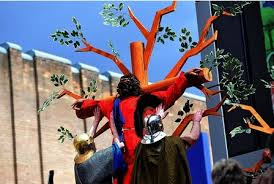Joy for Baba's devotees
Up to 7,000 people are expected at the opening of a temple in the city centre today.
The Shri Shirdi Sai Baba temple, at the grade II-listed Guild of Disabled building, in Colton Street, Leicester, is the second of its kind in the UK and follows the teachings of Sai Baba of Shirdi, a Hindu guru who lived from 1835 to 1914.
Worshippers from the organisation's temple in Wembley, London, have been preparing for the big day and expect many people from other Hindu temples around the Midlands to attend.
A temple management spokesman said: "Our organisation began in London in 2010 and this is our first venture in spreading Baba's message around the UK.
"The message is about treating everyone politely and humbly, helping the needy and having trust and patience.
"Part of our work will be sharing food with the poor and the hungry in Leicester. We have a kitchen here and people coming to the temple will also bring food to share.
"Word will spread fast."
One devotee who goes to the Wembley temple and who is staying in Leicester to help with the new temple's opening, said: "The building is awesome. We've had to put a lot of heat in to bring it alive but it's amazing for me to be here and be part of it.
"Because it's a building designated for worship we can feel free to say our prayers to our hearts' content."
Another visitor from London, helping with the final preparations yesterday, said: "It's a beautiful building and very spacious – it will be very good to see Leicester people able to enjoy themselves here.
"We are expecting thousands of people, brought by the teachings of Baba."
He said the temple offered a new twist on traditional Hinduism for followers of the faith.
He said: "I go to the London temple and I've also been involved with Baba and his teachings in India.
"In Hinduism there are hundreds of gods and teachings and it's like lots of schools teaching the same subject, but different teachers have slightly different messages. With Baba's teachings the focus is on patience."
The temple spokesman said: "Baba says trust and have patience and you will get results.
"A lot of people have experienced this working in their life and that's why they want to come."
The Guild of Disabled building, completed in 1909, is believed to have been the first building in Britain, and possibly the world, to be designed to be wheelchair-friendly.
Stuart Bailey, chairman of Leicester Civic Society, said: "It's always good to see new uses found for old buildings and I'm very pleased to hear the temple is opening. We look forward to them doing further work on the building – it needs cleaning up on the outside but they have done a lot."














